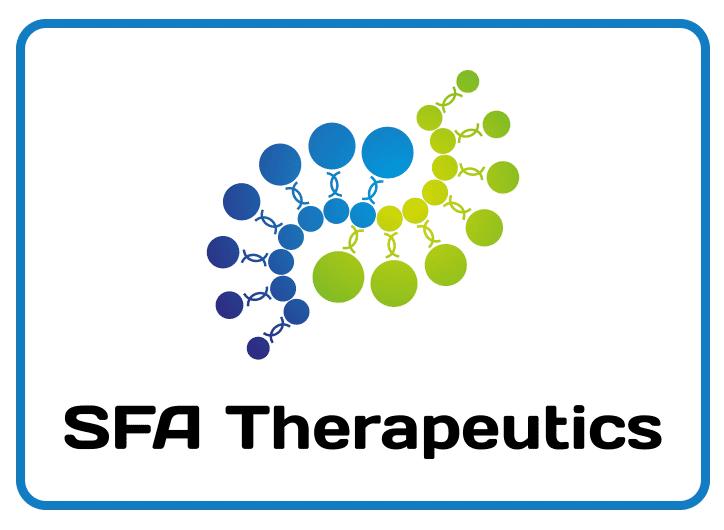预约演示
更新于:2025-05-07
IL-23 x TNF-α
更新于:2025-05-07
关联
8
项与 IL-23 x TNF-α 相关的药物作用机制 IFNγ抑制剂 [+5] |
非在研适应症- |
最高研发阶段临床2/3期 |
首次获批国家/地区- |
首次获批日期1800-01-20 |
作用机制 IL-23p19抑制剂 [+1] |
在研机构 |
非在研适应症- |
最高研发阶段临床2期 |
首次获批国家/地区- |
首次获批日期1800-01-20 |
作用机制 IL-23抑制剂 [+1] |
非在研适应症- |
最高研发阶段临床2期 |
首次获批国家/地区- |
首次获批日期1800-01-20 |
5
项与 IL-23 x TNF-α 相关的临床试验NCT06863493
Study of the Safety and Effectiveness of Oral SFA-002 Compared to Oral Apremilast (Otezla) Tablets and Placebo in Mild to Severe Plaque Psoriasis
The goal of this clinical trial] is to learn if SFA002 can treat mild, moderate and severe plaque psoriasis as good or better than Otezla, compared to placebo in adult and pediatric patients.
The main questions it aims to answer are:
How much does oral SFA002 treatment improve plaque psoriasis measured at different timepoints, 12 weeks, 24 weeks and 52 weeks of treatment.
How much does Oral Otezla (Apremilast) improve plaque psoriasis measured at different timepoints, 12 weeks, 24 weeks and 52 weeks of treatment.
These treatments will be compared to placebo, a look-alike substance that contains no drug.
Participants will be randomly placed into 3 groups to receive either SFA002, or oral apremilast or placebo for the duration of the trial. Patients that do not respond to apremilast or placebo treatment in 12 weeks will be offered the opportunity to take SFA002 for the remainder of the study.
There may be a higher burden for participants in this study compared to usual standard of care. Participants will attend regular visits per routine clinical practice. The effect of the treatment will be checked by medical assessments, checking for side effects, and questionnaires.
The main questions it aims to answer are:
How much does oral SFA002 treatment improve plaque psoriasis measured at different timepoints, 12 weeks, 24 weeks and 52 weeks of treatment.
How much does Oral Otezla (Apremilast) improve plaque psoriasis measured at different timepoints, 12 weeks, 24 weeks and 52 weeks of treatment.
These treatments will be compared to placebo, a look-alike substance that contains no drug.
Participants will be randomly placed into 3 groups to receive either SFA002, or oral apremilast or placebo for the duration of the trial. Patients that do not respond to apremilast or placebo treatment in 12 weeks will be offered the opportunity to take SFA002 for the remainder of the study.
There may be a higher burden for participants in this study compared to usual standard of care. Participants will attend regular visits per routine clinical practice. The effect of the treatment will be checked by medical assessments, checking for side effects, and questionnaires.
开始日期2025-06-01 |
申办/合作机构 |
NCT06080048
A Ph I Randomized Double-Blind First-in-Human Single Ascending Dose & Multiple Dose Study to Investigate the Safety Tolerability and Pharmacokinetics of SOR102 in Healthy Adult Participants and Patient Volunteers With Mild to Severe Ulcerative Colitis
SOR102-101 is a Phase 1, 3-part, randomised, double-blind, placebo-controlled, FIH study to determine the safety, tolerability, and PK of single, ascending oral doses (SAD) of SOR102 (Part 1) and multiple oral doses (Part 2) of SOR102 in healthy adult participants, and to assess the safety, tolerability, PK, and biological activity of multiple oral doses of SOR102 in patients with mild to severe UC (Part 3).
开始日期2023-10-24 |
NCT05242484
A Phase 2b Randomized, Double-blind, Active-and Placebo-controlled, Parallel-group, Multicenter Study to Evaluate the Efficacy and Safety of Induction and Maintenance Combination Therapy With Guselkumab and Golimumab in Participants With Moderately to Severely Active Ulcerative Colitis
The purpose of this study is to evaluate the efficacy and safety of JNJ-78934804 as compared to guselkumab and golimumab in participants with moderately to severely active ulcerative colitis who have had an inadequate initial response, loss of response, or intolerance to one or more approved advanced therapy.
开始日期2022-09-19 |
100 项与 IL-23 x TNF-α 相关的临床结果
登录后查看更多信息
100 项与 IL-23 x TNF-α 相关的转化医学
登录后查看更多信息
0 项与 IL-23 x TNF-α 相关的专利(医药)
登录后查看更多信息
3,413
项与 IL-23 x TNF-α 相关的文献(医药)2025-12-01·Current Rheumatology Reports
Fast, Present and Future of the Concept of Spondyloarthritis
Review
作者: Braun, J
2025-12-01·Inflammation Research
Accelerating and protective effects toward cancer growth in cGAS and FcgRIIb deficient mice, respectively, an impact of macrophage polarization
Article
作者: Chantawichitwong, Papasara ; Phuengmaung, Pornpimol ; Saisorn, Wilasinee ; Kumpunya, Sarinya ; Pisitkun, Prapaporn ; Thim-Uam, Arthid ; Leelahavanichkul, Asada ; Pisitkun, Trairak ; Kaewduangduen, Warerat
2025-12-01·Immunologic Research
Immunomodulatory effects of alexidine dihydrochloride on mammalian macrophages through the modulation of the JNK pathway
Article
作者: Aydın, Ece ; Ercan, Semanur ; Ayaz, Furkan ; Atalay, Begüm Rana ; Başkan, Ömer Mete ; Aydemir, Esra
299
项与 IL-23 x TNF-α 相关的新闻(医药)2025-05-04
·药智网
2025年,国产强直性脊柱炎(AS)治疗药物接连迎来突破:1月,智翔金泰的赛立奇单抗注射液获批新适应症,成为国内首个获批AS适应症的国产IL-17A抑制剂;3月,恒瑞医药的JAK1抑制剂艾玛昔替尼片获批上市,首个适应症就是强直性脊柱炎;紧接着4月,恒瑞医药的另一款产品——夫那奇珠单抗注射液成为第二款获批AS的国产IL-17A抑制剂。以恒瑞医药为代表的国产创新药强势突围,不仅打破了同类进口药物的长期垄断局面,为中国AS患者提供了新的治疗选择,更标志着国产创新药从“跟随者”向“破局者”的角色转变,为百亿AS药物治疗市场注入全新活力。1百亿药物治疗市场强直性脊柱炎是一种由于自身免疫紊乱造成身体各关节慢性炎症的疾病,主要会损伤骶髂关节和脊柱,进而引发其他部位的僵硬疼痛。如果治疗不及时,还会导致关节融合和脊柱僵化,波及眼睛、心肺和肠胃等身体器官。强直性脊柱炎的治疗方式分为手术治疗和药物治疗,药物治疗是早期AS的主要治疗方式。得益于医疗技术的不断进步,我国AS药物市场规模总体稳定增长,数据显示,2014年至2022年,市场规模由70.64亿元增至116.55亿元,年复合增长率达6.2%。2014-2022年中国强直性脊柱炎治疗药物市场规模及产值图片来源:智研咨询然而,由于强直性脊柱炎复杂的病理机制,使得AS的治疗难以通过单一手段奏效,在生物药问世前,AS的治疗长期停留在“缓解症状”阶段,主要依赖三类药物:非甾体抗炎药(NSAIDs)作为一线用药,它们通过抑制环氧酶(COX)活性,减少前列腺素合成,从而快速缓解疼痛和晨僵。代表药物包括双氯芬酸、塞来昔布等,约70%患者早期症状可得到控制。但这类药物仅能缓解症状,无法阻止骨破坏和疾病进展,长期使用还可能导致消化道出血、心血管事件等副作用。柳氮磺胺吡啶(DMARD)是传统的抗风湿药物,因其可以在肠道内分解成5-氨基水杨酸而起到抗炎和免疫抑制作用,在临床应用广泛,尤其是临床上可见外周滑膜炎症状患者,一般都选择柳氮磺胺吡啶进行用药。但该药作用缓慢,疗效不尽如人意。糖皮质激素(如泼尼松)在急性炎症期可快速缓解症状,但其全身性副作用(如骨质疏松、代谢紊乱)限制了长期应用,指南明确建议避免系统性使用,仅在局部关节注射时短期应用。整体而言,传统治疗药物价格便宜,构成早期治疗的“基石”,但在疾病控制深度和长期预后上存在明显短板,这也为创新药物的研发与市场拓展留下了广阔空间。2靶向药物重塑治疗范式近年来,强直性脊柱炎治疗领域迎来革命性突破,以生物制剂和靶向小分子药物为代表的靶向创新疗法,逐步取代传统药物的“治标”模式。这一变革不仅显著提升了患者生活质量,更推动了百亿级市场格局的重构。TNF-α抑制剂作为第一代生物制剂,通过中和TNF-α活性,快速缓解疼痛并抑制骨侵蚀,临床缓解率达60%-70%。艾伯维的阿达木单抗(修美乐)作为该领域标杆,自2002年获批上市至今,全球累计销售额超过2000亿美元,曾经11年蝉联“药王”,即使在生物类似药大量出现的2024年,依旧实现了89.9亿美元的销售额。IL-17A作为介导AS骨破坏的关键细胞因子,成为新一代靶向治疗的重要突破口。多项临床研究显示,IL-17抑制剂能有效减少患者椎体边缘的炎症损伤和脂肪沉积,抑制新生骨赘的形成并延缓影像学进展。与TNF-α相比,IL-17A高度参与AS炎症的发生发展,抑制IL-17A可为患者提供更直接、更广泛的治疗获益。司库奇尤单抗是全球第一个上市的IL-17A抑制剂,2020年在中国获批AS适应症,2024年全球销售额达到61.41亿美元,同比增长25%。与此同时,以JAK抑制剂为代表的小分子药物以口服给药为核心优势,成为生物制剂之外的重要补充。研究显示,JAK抑制剂能直接阻断与脊柱关节炎发病相关的多种细胞因子通路信号,在AS治疗领域极具前景。辉瑞的托法替布和艾伯维的乌帕替尼已在中国获批AS适应症,其中乌帕替尼2024年全球销售额达59.71亿美元,同比增长50.4%。除已获批疗法外,AS治疗领域的创新探索持续活跃。IL-23抑制剂、PDE4抑制剂等新机制药物已进入临床研究阶段,双特异性抗体、干细胞移植、基因编辑技术等前沿方向也为攻克难治性AS提供新路径。这些疗法与生物制剂、小分子靶向药共同构建起多元化治疗体系,而国产创新药的加速上市为百亿市场重构注入新动能。3国产创新药崛起中国强直性脊柱炎药物市场正在经历一场国产化变革。过去十年,以生物类似药为切入点,国内药企逐步打破进口垄断,而2025年国产创新药的密集获批,标志着这一领域正式迈入“自主创新”时代。自2019年11月百奥泰的格乐立获批上市以来,国内阿达木单抗生物类似药已增至7款,且均覆盖AS适应症。国产生物类似药的上市,显著拉低了AS治疗门槛:原研药修美乐经医保报销后,首年及维持治疗费用仍在3万元以上,而国产阿达木单抗如格乐立、汉达远、苏立信等,通过援助计划等方式首年费用和每年维持费用仅需1.5万元左右。随着司库奇尤单抗、乌帕替尼等重磅品种的生物类似药/仿制药进入临床III期,叠加生物类似药集采政策推进,国产药企正以惊人速度加速渗透AS药物市场。真正改写市场格局的是国产创新药的技术突破。智翔金泰的赛立奇单抗通过双载体噬菌体平台技术稳定药物分子,延长疗效持续时间并降低给药频率,为患者提供更便捷的治疗方案。恒瑞医药的夫那奇珠单抗采用人源化抗体结构,与已获批的司库奇尤单抗和依奇珠单抗相比,具有更高的IL-17A亲和力,能更高效阻断IL-17A/IL-17R信号通路,强化骨破坏抑制效果。其JAK1抑制剂艾玛昔替尼则通过引入特色药效团结构组合,更加精准作用于JAK1,对JAK2及JAK3的抑制作用明显更低,显著减少贫血、血小板减少等造血系统不良反应,为长期用药安全性提供保障。在研管线中的“下一代疗法”则展现出中国药企的前瞻性布局。丽珠医药和鑫康合生物合作研发XKH004是国产进展最快的IL-17A/F双抗,同时阻断两种促炎因子,III期临床结果显示出同类最佳的治疗潜力;诺诚健华的TYK2抑制剂ICP-332可以减少抑制其他JAK家族成员所带来的副作用,有望成为替代JAK1抑制剂的口服小分子药物。从生物类似药打破价格壁垒,到创新药实现靶点突破,中国药企正以“中国速度”重塑强直性脊柱炎治疗生态。根据弗若斯特沙利文预测,2030年中国自免药物市场规模将达247亿美元,其中国产创新药份额将突破50%,AS领域或将彻底扭转“进口药主导”的历史格局。4结语长期来看,包括强直性脊柱炎在内的自身免疫疾病领域治疗药物市场空间广阔,国内药企在创新研发的道路上高歌猛进,随着更多创新成果落地,不仅将重塑AS药物市场格局,为患者带来福音,还将在全球医药市场中占据更加重要的地位,推动中国创新药迈向新高度。参考资料1.《干细胞能为强直性脊柱炎患者带来曙光吗?》,细胞工坊,2022年10月14日2.《聚焦AS的致病机制,解析IL-17A抑制剂为何能在AS治疗中取得突破》,医学界风湿免疫频道,2025年3月13日声明:本内容仅用作医药行业信息传播,为作者独立观点,不代表药智网立场。如需转载,请务必注明文章作者和来源。对本文有异议或投诉,请联系maxuelian@yaozh.com。责任编辑 | 史蒂文合作、投稿、转载开白 | 马老师 18323856316(同微信) 阅读原文,是受欢迎的文章哦
上市批准
2025-04-30
·小药说药
-01-引言炎症性肠病(IBD)由溃疡性结肠炎(UC)和克罗恩病(CD)组成,全球约有600万至800万人受到影响。作为一种慢性、进行性和复发性的肠道疾病,IBD严重影响患者的生活质量和日常生活,增加医疗负担。虽然目前普遍认为IBD是由遗传易感个体对微生物的异常免疫反应引起的,但其确切的发病机制在很大程度上尚不清楚。目前可用的IBD治疗包括非靶向治疗(如氨基水杨酸、糖皮质激素和免疫调节剂)和靶向治疗(如抗TNF、抗IL-12/IL-23和抗α4β7整合素)。虽然生物靶向疗法对许多患者有效,但依然有高达30%的患者对初始治疗没有反应,高达50%的患者随着时间的推移反应消失。因此,深刻理解肠免疫系统的运行机制和IBD的免疫发病机制,将有助于我们开发针对IBD的免疫治疗药物,并为IBD提供了新的免疫治疗手段。-02-一、肠道免疫系统肠道微生物群人类肠道微生物群由数万亿种微生物组成,包括真菌、单细胞动物、病毒、古生菌和占绝大多数的细菌。肠道微生物群通过调节固有免疫系统的激活,影响宿主能量代谢、免疫稳态和成熟,以及维持粘膜完整性,在IBD的发病机制中发挥着至关重要的作用。越来越多的证据表明IBD患者肠道微生物群的组成发生了改变。例如,大肠杆菌作为病原菌在肠道中增加,具有在巨噬细胞中生存和复制的能力,并诱导IBD中TNF-α的分泌和炎症反应。此外,作为益生菌的prausnitzii粪杆菌可以刺激DC分泌抗炎细胞因子IL-10,并抑制肠道中IL-12和INF-γ的产生,而IBD患者的肠道中这些细胞因子显著减少。此外,IBD患者肠道微生物群的代谢产物也会发生改变,例如胆汁酸代谢中断、色氨酸代谢水平降低、SCFA减少以及烟酸、牛磺酸和酰基卡尼汀水平升高。这些代谢物在肠道炎症过程中的丢失可能是IBD发病的驱动力。肠上皮细胞(IECs)肠上皮是人体最大的粘膜表面,充当管腔内容物和潜在免疫系统之间的物理和生化屏障。它由单层不同亚型的特异性内皮细胞组成,主要包括柱状上皮、杯状细胞和Paneth细胞。杯状细胞作为肠上皮的分泌细胞,可以在肠粘膜的管腔表面分泌粘液,粘液层提供了第一道防线。Paneth细胞是一种特殊的含有颗粒的细胞,存在于小肠的上皮隐窝中,在先天性肠道防御和保护附近干细胞中起着至关重要的作用。它们可以产生抗菌肽(AMP),如α-防御素、溶菌酶C、磷脂酶和C型凝集素等,这些抗菌肽可以对抗侵入的管腔病原体。已经证明,AMP在CD患者中存在缺陷。肠上皮的另一个重要组成部分是顶端连接复合体,由紧密连接(TJ)、粘附连接(AJ)和桥粒组成,紧密密封肠上皮细胞,以防止病原体进入,并调节对水、离子和营养素的渗透性。编码TJ的基因突变和TJ功能障碍已被阐明为IBD的关键致病因素。肠道免疫细胞肠道免疫细胞可分为天然免疫细胞和适应性免疫细胞,这两种细胞对IBD的免疫反应都有很大贡献。固有免疫细胞,如巨噬细胞、树突状细胞(DC)、中性粒细胞、自然杀伤(NK)细胞和固有淋巴细胞(ILC),相互作用并产生细胞因子、趋化因子和抗菌素,以触发炎症,导致吞噬、抗原提呈和适应性免疫系统的激活。巨噬细胞、树突状细胞、中性粒细胞、NKT细胞和ILC构成粘膜固有免疫系统的第一道防线。这些固有免疫系统的免疫细胞通过病原体相关分子模式(PAMP),导致多种信号通路的激活,并产生促炎细胞因子、趋化因子和抗菌肽。与天然免疫细胞相比,适应性免疫细胞具有高度的特异性和免疫记忆能力,它们相互补充,消除入侵病原体。适应性免疫反应的关键参与者是T细胞,在肠道相关淋巴组织(GALT)或肠系膜淋巴结中的抗原刺激下,原始T细胞被激活并分化为不同的亚群,在趋化因子受体(如CCR9和CCR10)和整合素等细胞粘附分子作用下迁移到肠道的炎症部位。如今,许多针对这些受体的药物已成功用于临床实践,以阻止T细胞向肠道迁移,以预防IBD患者的炎症。-03- 二、IBD的免疫学发病机制IL-22和IL-6IL-22是一种多效性细胞因子,由Th22、Th17和Th1细胞分泌,激活STAT3以促进肠组织修复并抑制肠道病原体。在IBD中,IL-22受微生物群的信号诱导在小肠中广泛表达。此外,IL-22还促进IBD易感基因如fut2、sec1、bcl2115和PTPN22的表达。IL-6主要由固有层中的巨噬细胞和树突状细胞产生。研究发现,CD患者血清和肠道中IL-6水平升高,并与临床疾病活动、复发频率和炎症严重程度相关。与受体结合后,IL-6激活gp130阳性T细胞,导致STAT-3信号转导和转录激活,随后激活抗凋亡基因Bcl-2和Bcl-xl的转录。目前,人源化抗IL-6R单克隆抗体tocilizumab已经用于治疗IBD。IL-12/IL-23由树突状细胞产生的IL-12和IL-23均属于IL-12家族,在慢性炎症性疾病的发病机制中发挥重要作用。在几种结肠炎模型中,致病性T细胞反应由IL-12和IL-23驱动。IL-12可以促进原始CD4+T细胞分化为产生IFN-γ的Th1细胞,并促进NK细胞、NKT细胞和细胞毒性T细胞的增殖和效应功能。IL-23通过加强和影响Th17细胞反应来发挥其生物学功能,同时它还拮抗抗炎Foxp3+Treg细胞反应从而促进肠道炎症。IL-17IL-17细胞因子,包括IL-17A和IL-17F,也在IBD的发病机制中发挥重要作用。全基因组关联研究(GWAS)已确定了许多与Th17相关的IBD易感基因,包括JAK2、STAT3、IL-23R、IL-12B和CCR6。临床研究发现,与健康对照组相比,IBD患者的肠粘膜和固有层中含有更高水平的Th17细胞、IL-17和IL-23。在小鼠模型中,IL-17A和IL-17F的缺陷显示对结肠炎具有保护作用。Il-10IL-10是抑制免疫系统促炎反应的最重要细胞因子,可由大量不同类型的细胞产生,包括Treg、巨噬细胞、树突状细胞等。在IBD患者的早期发病过程中,IL-10R亚单位基因的突变与肠道炎症免疫反应有关。事实上,IL-10和IL-10R缺陷小鼠都可以发生自发性结肠炎。此外,Treg细胞中c-MAF失活也会导致IL-10产生功能障碍,从而发展为自发性结肠炎。IL-1β家族细胞因子IL-1β是一种由巨噬细胞分泌的促炎细胞因子,与其他促炎细胞因子(如TNF-α和IL-6)协同作用,以诱导IBD炎症。研究发现,IL-10缺陷小鼠在自发性结肠炎发病前IL-1β分泌增加。此外,IL-1β和IL-18信号的遗传缺陷或抑制可缓解实验性结肠炎。TNF和TNF样配体1A(TL1A)TNF被认为是IBD发病机制中的促炎细胞因子,可刺激急性期时的反应,促进IL-1和IL-6的分泌,增加粘附分子的表达。研究发现,活动期IBD患者的血液、上皮组织和粪便中TNF-α显著升高,其水平与CD患者的临床疾病活动性相关。通过抗TNF-α单克隆抗体阻断TNF-α信号已成为中重度难治性IBD患者的重要治疗方法。TNF家族成员TL1A也被发现是肠道炎症的关键介质,在IBD患者中水平也升高。TL1A主要通过结合死亡受体3(DR3)发挥其功能,TL1A还可以协同促进IL-4、IL-12和IL-23的产生,并通过Th1、Th2和Th17细胞增加DR3的表达,以促进炎症。免疫细胞迁移免疫细胞迁移到肠道以启动和维持免疫反应是IBD的关键发病机制,其中T细胞迁移是最重要的一个。免疫细胞迁移的完整过程包括栓系、滚动、激活、粘附和外渗,涉及各种整合素、选择素、趋化因子及其配体或受体,例如促进迁移到小肠的整合素α4β7、α4β1、β2整合素和CCR9。针对免疫细胞迁移不同阶段的多种治疗方法已经应用于临床。-04-三、IBD的免疫治疗目前,7种生物制剂已被美国食品和药物管理局(FDA)正式批准用于治疗IBD,许多治疗IBD的创新候选药物的临床试验也正在进行中。靶向TNF-α抗TNF的抗体已广泛使用约25年。目前,四种TNF-α抑制剂已被批准用于临床,包括infliximab、adalimumab、golimumab和certolizumab pegol。infliximab可诱导粘膜溃疡愈合,这是第一种被批准用于CD肛周瘘的治疗方法,并被证明对CD和UC都有效。Adalimumab被证明可诱导CD的粘膜愈合,它对CD和UC以及对infliximab失去反应的CD患者也有效。此外,golimumab和certolizumab pegol也在美国被批准用于治疗UC。虽然抗肿瘤坏死因子治疗显示出临床疗效,但10-30%的IBD患者没有响应,20-40%的患者随着时间的推移失去响应。靶向IL-12/IL-23Ustekinumab是针对IL-12和IL-23的p40亚单位的单克隆抗体,在治疗IBD中显示出积极作用,它是目前FDA批准的唯一一种抗IL-23疗法。另一个靶点是针对IL-23的p19亚单位,也显示出了临床疗效,包括risankizumab、brazikumab、guselkumab和Mirikizumab。然而,这些抗体仍处于临床试验阶段。靶向JAKJanus激酶(JAK)家族包含四种细胞内酪氨酸激酶:JAK1、JAK2、JAK3和非受体酪氨酸蛋白激酶2,它们激活STAT通路并在IBD的发病机制中发挥关键作用。目前,已经评估了10种JAK抑制剂对IBD的临床疗效,而Tofacitinib是唯一具有临床疗效的抑制剂,并被批准用于UC的临床治疗。靶向细胞粘附分子作为T细胞募集和肠道炎症的重要介质,细胞粘附分子是IBD的潜在靶点。例如,抗α4β7整合素抗体vedolizumab和抗a4整合素单克隆抗体natalizumab在治疗IBD方面显示出了很好的疗效,目前已被批准并广泛应用于临床。此外,Etrolizumab(一种选择性结合β7亚单位的单克隆抗体)、abrilumab(一种阻断α4β7整合素的单克隆抗体)和ontamalimab(一种靶向MAdCAM-1的人源化抗体)在临床前数据中也显示出疗效,目前仍在进行临床试验。靶向NLRP3炎症小体NLRP3炎症小体和促炎细胞因子水平升高是IBD的主要病理机制。已经观察到CD患者具有高水平的NLRP3炎症小体。此外,活化的NLRP3炎性小体可促进过量IL-1β的产生,并改变结肠上皮中TJ的表达,从而加速疾病进展。因此,靶向NLRP3炎症小体为IBD治疗提供了一种有前景的策略。-05-结语在过去的几十年里,IBD的免疫学机制取得了很大进展,为IBD的治疗提供了新的策略和新的思路。在未来,特定基因位点的改变可能是IBD很有希望的治疗方法。此外,新型抗体或抑制剂、联合治疗方案和多因子阻断剂也有望打破IBD治疗的瓶颈,为IBD的患者的疾病改善带来福音。参考资料:1.Immunology of Inflammatory Bowel Disease: Molecular Mechanisms and Therapeutics. J Inflamm Res.2022; 15: 1825–1844.
免疫疗法微生物疗法
2025-04-30
关注并星标CPHI制药在线过去25年,自身免疫性疾病治疗领域经历了从广谱抗炎到靶向精准调控的深刻变革(图1)。以肿瘤坏死因子(TNF)抑制剂(如英夫利昔单抗和阿达木单抗)为代表的细胞因子信号调节药物,奠定了免疫治疗创新的基石,并成为多适应症的标准疗法。近年来,随着白细胞介素(IL)家族抑制剂、JAK/TYK2激酶抑制剂及新兴靶点的崛起,行业正加速向精准化与多样化迈进。全球自身免疫药物市场已稳居第二大治疗领域,2024年TOP100畅销药中自免药物占比15款,总销售额达829.5亿美元。本文将深入分析当前靶点格局、跨疾病影响及未来创新方向。 图1.自身免疫性疾病机制的模式图[2]治疗靶点前景:从传统核心到新兴路径的扩展自 2020 年以来,已推出 4 种针对自身免疫性疾病的 first-in-class 药物,其中 3 种针对皮肤病适应症中的上皮屏障功能障碍和炎症(IL-13、IL-31 和 IL-36 抑制剂)。第四种也在皮肤病学中,是一种酪氨酸激酶 2 (TYK2) 抑制剂,可调节 IL-12 和 IL-23 等细胞因子下游的信号传导。在分析的 92 个治疗靶点中,正在研究的自免药物数量从 2020 年的 131 种增加到 2024 年的 193 种(+47%)(图2)。TNF超家族与IL家族的持续主导尽管TNFα抑制剂仍是基石,但靶向TNF超家族其他成员(如OX40、TL1A、BLyS/BAFF)的疗法正快速推进。2020年仅CD40/CD40L轴处于III期,而2024年TL1A、RANK等靶点药物已进入关键试验阶段,其中TL1A抑制剂在克罗恩病和溃疡性结肠炎中展现出潜力。IL家族则通过选择性增强(如IL-17A/F双靶点抑制剂)、长效化(如GSK的IL-5抑制剂depemokimab)及口服小分子(如礼来的IL-17口服药)实现迭代创新。IL-4、IL-33、IL-18等靶点的首 创新药(first-in-class)成为新焦点,而IRAK4因可同时抑制IL-1家族和Toll样受体信号,被视为多疾病干预的关键靶点(图2)。 图2.自免在研管线及产品[1]下游激酶与联合疗法的突破JAK抑制剂虽在风湿病等领域广泛应用(图2),但其对造血系统的副作用促使行业转向更具选择性的TYK2抑制剂。例如,百时美施贵宝的TYK2抑制剂Sotyktu通过调节IL-12/23通路,在银屑病中展现出优于传统JAK抑制剂的耐受性。联合策略(如IL-17+TNF双靶向、JAK/TYK2双激酶抑制剂)进一步拓宽治疗窗口,尤其在银屑病和克罗恩病中取得进展。2型炎症性疾病的关键靶点竞争针对特应性皮炎、哮喘等2型炎症疾病,IL-4/IL-13抑制剂(如度普利尤单抗)通过阻断IL-4Rα亚基,成为多适应症的重磅药物(图2)。TSLP抑制剂(如tezepelumab)则通过靶向上游警报素,在严重哮喘和COPD中取得突破。此外,IL-31(瘙痒通路)和IL-36(脓疱型银屑病)等新靶点的崛起,标志着皮肤病治疗的进一步细分。 跨疾病影响:从局部到系统的治疗革新皮肤病学的领先突破自2020年以来,皮肤病领域(图3)迎来多款创新药物:IL-13抑制剂:Tralokinumab和Lebrikizumab用于中重度特应性皮炎,显著改善表皮屏障功能。 IL-17A/F双靶点抑制剂:Bimekizumab在斑块状银屑病中实现更高缓解率(PASI90达80%以上),挑战TNF抑制剂地位。IL-36抑制剂:Spesolimab成为泛发性脓疱型银屑病的首个特异性疗法。JAK/TEC抑制剂:辉瑞的Litfulo作为首个获批的脱发治疗药物,凸显激酶抑制剂的多适应症潜力。 图3.一些典型自身免疫性疾病的模式图[2]风湿病与胃肠道疾病的扩展JAK抑制剂在类风湿性关节炎和强直性脊柱炎中持续扩展,选择性JAK1抑制剂(如乌帕替尼)因更低副作用备受青睐。胃肠道领域,IL-23抑制剂(如古塞奇尤单抗)在克罗恩病中对比传统疗法显示优效性,III期试验中内镜缓解率提升76%。嗜酸性食管炎则通过IL-4/13靶向药物(如度普利尤单抗)实现症状显著改善。呼吸系统与系统性疾病的新机遇首个TSLP抑制剂tezepelumab在严重哮喘中降低急性发作率,而IL-33靶向药物(如itepekimab)为COPD提供新治疗类别。系统性红斑狼疮(SLE)和干燥综合征(图3)则通过CD40/CD40L轴(如dazodalibep)和BAFF抑制剂探索突破。 未来展望:精准医疗与多维创新新兴靶点与首创新药的竞争TL1A与OX40/OX40L轴:默克的tulisokibart和罗氏的RVT-3101以及赛诺菲/Teva 的 duvakitug等TL1A抑制剂在炎症性肠病中进入III期,有望为克罗恩病和溃疡性结肠炎患者带来新的治疗方案;安进的 rocatinlimab 和赛诺菲的 amlitelimab 是靶向 OX40/OX40L T 细胞活化轴的新型药物,有望解决 IL-4 和 IL-13 产生的关键上游调节因子。IL-33:阿斯利康的tozorakimab(IL-33/ST2双靶点)和赛诺菲的itepekimab是两种针对 IL-33 的竞争性候选药物,预示COPD等呼吸疾病治疗的进一步分化。此外,CD40/CD40L轴可能引入全身性疾病的治疗替代方案,包括治疗干燥综合征的达唑达利贝 (Amgen) 和治疗系统性红斑狼疮的达匹利珠单抗 (Biogen/UCB)(图2)。 图2.按治疗领域划分的选定自身免疫性疾病的管道靶点前景(II 期和 III 期)的演变[1]从剂型优化到生物标志物中国自免市场快速增长,2030年预计达231亿美元,但生物药占比仍低于全球(2021年32.9% vs. 全球69.8%)。医保覆盖与仿制药冲击(如芦可替尼首仿上市)将加速市场洗牌,而国产IL-17抑制剂(恒瑞、智翔金泰)有望打破外资垄断。口服小分子(如礼来的IL-17口服药)与长效注射制剂(如每月一次的IL-5抑制剂)提升患者依从性。生物标志物驱动的分层治疗(如IL-23抑制剂的黏膜愈合指标)正成为临床研究核心,助力精准患者筛选。联合疗法与多适应症拓展IL-17+TNF双靶向策略在银屑病关节炎中探索协同效应,而JAK/TYK2双激酶抑制剂可能平衡疗效与安全性。多适应症布局(如度普利尤单抗覆盖皮炎、哮喘、嗜酸性食管炎)成为药企提升产品生命周期的重要策略。结语自身免疫治疗正迈向以机制驱动、患者为中心的新时代。未来十年,随着疾病特异性靶点的解析,以及基因编辑、多组学技术的应用,个体化治疗方案将逐步实现。中国凭借庞大的患者基数与创新药企崛起,或重塑全球市场格局。参考资料: [1]Fauconnier, Alexandre et al. “Trends in the drug target landscape for autoimmune diseases.”Nature reviews. Drug discovery, 10.1038/d41573-025-00061-7. 3 Apr. 2025,[2] Song, Yi et al. “Evolving understanding of autoimmune mechanisms and new therapeutic strategies of autoimmune disorders.”Signal transduction and targeted therapy vol. 9,1 263. 4 Oct. 2024, [3] Fugger, Lars et al. “Challenges, Progress, and Prospects of Developing Therapies to Treat Autoimmune Diseases.”Cell vol. 181,1 (2020): 63-80.END领取CPHI & PMEC China 2025展会门票来源:CPHI制药在线声明:本文仅代表作者观点,并不代表制药在线立场。本网站内容仅出于传递更多信息之目的。如需转载,请务必注明文章来源和作者。投稿邮箱:Kelly.Xiao@imsinoexpo.com▼更多制药资讯,请关注CPHI制药在线▼点击阅读原文,进入智药研习社~
免疫疗法临床3期临床结果临床2期
分析
对领域进行一次全面的分析。
登录
或

生物医药百科问答
全新生物医药AI Agent 覆盖科研全链路,让突破性发现快人一步
立即开始免费试用!
智慧芽新药情报库是智慧芽专为生命科学人士构建的基于AI的创新药情报平台,助您全方位提升您的研发与决策效率。
立即开始数据试用!
智慧芽新药库数据也通过智慧芽数据服务平台,以API或者数据包形式对外开放,助您更加充分利用智慧芽新药情报信息。
生物序列数据库
生物药研发创新
免费使用
化学结构数据库
小分子化药研发创新
免费使用


